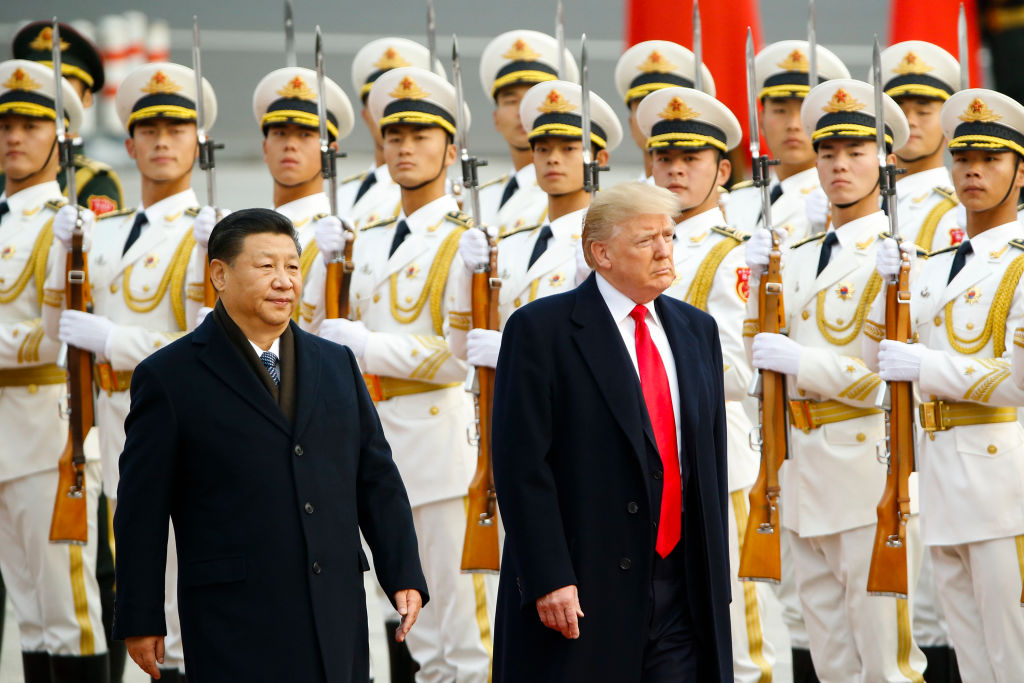How America can win its tech war with China
Entrepreneurship, investment, immigration — America, you do you


The U.S.-China trade throwdown isn't just about helping "American steel," protecting Corporate America's intellectual property, reducing bilateral trade deficits, or really much of what President Trump typically tweets about. To focus exclusively on tariffs or international investment flows misses the big picture.
What's actually playing out on a global stage is an escalating conflict to be the technological leader and thus leading economic superpower of the 21st century.
Beijing made its fighting intent clear in 2015 when it announced its goal to create "national champions" in 10 high-tech manufacturing sectors by 2025. Since then, it has expanded its ambitions with a strategic plan to become the world leader in artificial intelligence, a technology that a recent McKinsey Global Institute report called the "transformational technology of our digital age."
The Week
Escape your echo chamber. Get the facts behind the news, plus analysis from multiple perspectives.

Sign up for The Week's Free Newsletters
From our morning news briefing to a weekly Good News Newsletter, get the best of The Week delivered directly to your inbox.
From our morning news briefing to a weekly Good News Newsletter, get the best of The Week delivered directly to your inbox.
Understanding the nature of this conflict makes it clear why the Trump administration's recent tariff plan targeted those strategic "Made in China" high-tech sectors. Also part of the clash was Washington's moves this week to stop the sale of Huawei telecommunications gear by U.S. telecom carriers and bar ZTE from buying U.S.-made components for seven years, perhaps crippling that company. "We are in a new cold war with Beijing to retain control of the technology critical to the modern economy," Richard Staropoli, chief information officer for the U.S. Department of Homeland Security, recently wrote in the Financial Times.
To many, this story may sound familiar. Before China there was Japan, a rising Asian power that 1980s America saw as an existential threat to its economic and technological supremacy. Politicians campaigned against trade deficits and campaigned on "economic patriotism." Think tanks put out reports advising America to move away from its old-fashioned free-market thinking and embrace Japan's economic model with government more actively aiding business. Dread of Japan's ascendance permeated deep into American culture. The TV Tropes web site has a lengthy entry on "Japan Takes Over the World," citing numerous films, television shows, books, and video games that used this theme. For instance: In the 1989 Ridley Scott film, Black Rain, a Japanese cop in Tokyo tells his visiting American counterpart (played by Michael Douglas), "We make the machines, we build the future, we won the peace."
Another 1980s Japan worrier was Donald Trump. During the 1980s, Trump frequently made colorful attacks on the U.S.-Japan trading relationship. The same year Black Rain came out, Trump in a television interview said Japan had "systematically sucked the blood out of America — sucked the blood out!" Of course it wasn't long after that Japan's stock and real estate markets crashed, leading to a long period of Japanese economic stagnation while the U.S. accelerated into the 1990s internet boom.
Trump's views on Japan never really changed, and to a great extent he understands China in the same way: a parasitic economy draining America of its manufacturing base and the jobs that went along with it. But that's an exaggerated and backward-looking perspective. America still has a high-output, high-productivity manufacturing sector. And it should be the goal of U.S. policy to meet the unique Chinese challenge, one that combines the 1980s economic challenge of Japan with the 1980s military and ideological challenge of the Soviet Union. And while the U.S. should not allow Chinese firms to steal American technology or force companies to hand over their blueprints, a strategy of retarding China's technological advance won't work. China has too many scientists, generates too much valuable data, and contains too much entrepreneurial drive.
A free daily email with the biggest news stories of the day – and the best features from TheWeek.com
Now some U.S. policymakers underestimate China's challenge. During Facebook CEO Mark Zuckerberg's Senate testimony the other day, Sen. Dan Sullivan (R-Alaska) was taken aback when Zuckerberg disagreed with his proposition that "only in America" could someone take a tech company form a "dorm room to global behemoth." As Zuckerberg corrected him, "Well — well, senator, there are — there are some very strong Chinese internet companies." Zuckerberg was surely thinking about Chinese tech giants such as Alibaba, Baidu, and Tencent, which have a combined market value of over $1 trillion.
Nor should we be against China advancing its tech prowess. In an internet-connected, globalized economy, national economies gain from each others' advances. As Harvard's Amar Bhide argues in The Venturesome Economy, "the expansion of the global supply of cutting-edge research, regardless of where it originates, is a good thing." America's global tech competition doesn't have to be a zero-sum game. Indeed, given the interdependent nature of American and Chinese companies, policymakers must make sure it isn't.
The only realistic path forward for America is to continue to push the technological frontier and race ahead of competitors. That primarily means it needs to continue to do what it does best: Create bold and innovative new tech firms that will eventually become tech giants. These companies — such as Amazon, Apple, and Google — not only offer great products and services but pour billions into cutting-edge research. Taxes and regulations matter. So, too, does not recklessly breaking these companies up because they're "too big and powerful." Beyond that, the U.S. needs to invest more at the federal level into basic science research and continue to attract high-skill immigrants who want to do great things with their lives. Both these things were key to America's tech supremacy in the 20th century.
Entrepreneurship, investment, immigration — America, you do you.
James Pethokoukis is the DeWitt Wallace Fellow at the American Enterprise Institute where he runs the AEIdeas blog. He has also written for The New York Times, National Review, Commentary, The Weekly Standard, and other places.
-
 How the War Department became the Department of Defense – and back again
How the War Department became the Department of Defense – and back againIn Depth In 1947 President Harry Truman restructured the US military establishment, breaking with naming tradition
-
 Sudoku hard: December 8, 2025
Sudoku hard: December 8, 2025The daily hard sudoku puzzle from The Week
-
 Codeword: December 8, 2025
Codeword: December 8, 2025The daily codeword puzzle from The Week
